Mark Anthony Neal's Blog, page 496
September 16, 2017
How Colonialism in the Caribbean Affects Hurricane Prep and Recovery
 'Yarimar Bonilla, associate professor of anthropology and Caribbean studies at Rutgers University, a visiting scholar at the Russell Sage Foundation, and author of Non-Sovereign Futures: French Caribbean Politics in the Wake of Disenchantment (University of Chicago Press, 2015), talks about the colonial history- and present - of the Caribbean islands hit hard by Irma, and how that affects residents, and the islands' hurricane preparedness and recovery.' -- The Brian Lehrer Show
'Yarimar Bonilla, associate professor of anthropology and Caribbean studies at Rutgers University, a visiting scholar at the Russell Sage Foundation, and author of Non-Sovereign Futures: French Caribbean Politics in the Wake of Disenchantment (University of Chicago Press, 2015), talks about the colonial history- and present - of the Caribbean islands hit hard by Irma, and how that affects residents, and the islands' hurricane preparedness and recovery.' -- The Brian Lehrer Show
Published on September 16, 2017 17:56
Taylor Swift: Alt-Right Icon
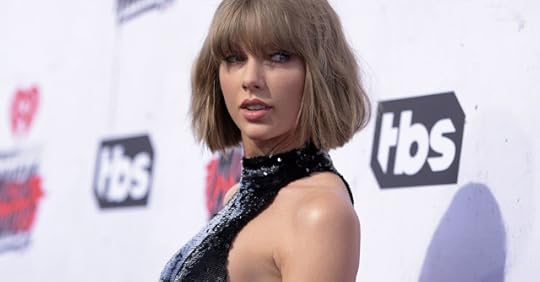 'Taylor Swift is a star of many faces – known variously as a country music darling, a pop music sensation, a forlorn damsel, the powerful leader of her girl squad and, perhaps above all else, a savvy marketer. Less well-known is her reputation within the alt-right, where she's become the object of affection for white supremacists. While few suspect Taylor Swift of harboring any sympathy for the white supremacists who love her, the affection she's garnered raises some questions: Why her? Why now? And, in the wake of Charlottesville, does she have a responsibility to denounce their hateful ideology? Brooke speaks with Mitchell Sunderland, Senior Staff Writer at Vice, who first broke the story of Taylor Swift’s alt-right following last year.' -- On The Media
'Taylor Swift is a star of many faces – known variously as a country music darling, a pop music sensation, a forlorn damsel, the powerful leader of her girl squad and, perhaps above all else, a savvy marketer. Less well-known is her reputation within the alt-right, where she's become the object of affection for white supremacists. While few suspect Taylor Swift of harboring any sympathy for the white supremacists who love her, the affection she's garnered raises some questions: Why her? Why now? And, in the wake of Charlottesville, does she have a responsibility to denounce their hateful ideology? Brooke speaks with Mitchell Sunderland, Senior Staff Writer at Vice, who first broke the story of Taylor Swift’s alt-right following last year.' -- On The Media
Published on September 16, 2017 17:46
For Teen Activists, What Good Is a Protest Song?
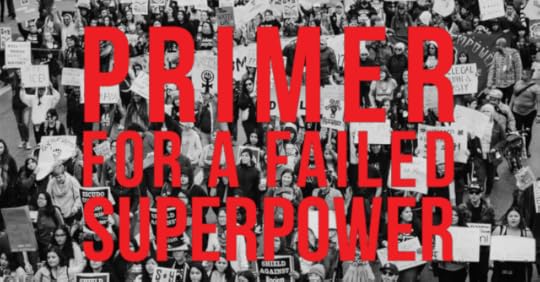 'Since the Inauguration, in January, there’s been a kind of protest renaissance for those on the left and some in the center of American politics; at rallies and marches, they’ve dusted off chants and songs that became symbols of resistance during the civil-rights and Vietnam eras. But many of these protesters weren’t alive in the sixties, and the songs of their parents’ or grandparents’ generations may not resonate for them. “Primer for a Failed Superpower” was a concert performance, organized by the theatre company the TEAM, that mixed classic protest songs with contemporary anthems, all sung by a cast that spanned generational lines from boomers to teens. The New Yorker’s Vinson Cunningham talked to two young performers, Maxwell Vice and Logan Rozos, about how that generational divide played out, and what public protest is worth in the age of social media.' -- The New Yorker Radio Hour
'Since the Inauguration, in January, there’s been a kind of protest renaissance for those on the left and some in the center of American politics; at rallies and marches, they’ve dusted off chants and songs that became symbols of resistance during the civil-rights and Vietnam eras. But many of these protesters weren’t alive in the sixties, and the songs of their parents’ or grandparents’ generations may not resonate for them. “Primer for a Failed Superpower” was a concert performance, organized by the theatre company the TEAM, that mixed classic protest songs with contemporary anthems, all sung by a cast that spanned generational lines from boomers to teens. The New Yorker’s Vinson Cunningham talked to two young performers, Maxwell Vice and Logan Rozos, about how that generational divide played out, and what public protest is worth in the age of social media.' -- The New Yorker Radio Hour
Published on September 16, 2017 17:41
Musiq Soulchild Discusses New Album, "Feel The Real"
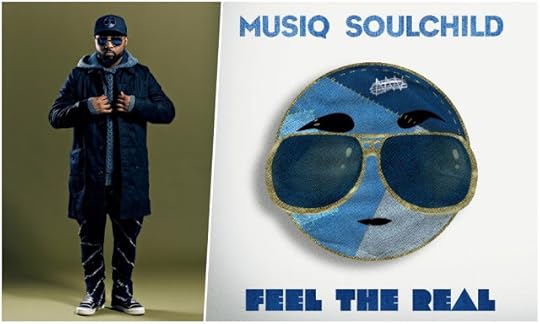 'Grammy-nominated and Platinum-selling artist Musiq Soulchild is a hip-hop soul artist that has built a reputation for being musically gifted, beat boxing for MC’s, free styling on the open mic circuit or just performing acappella for strangers on the streets. Deeply inspired by the R&B/Soul sound of the 70’s, he uses the name “Soulchild” as a way to show respect and admiration to his biggest musical influences such as Stevie Wonder, Donny Hathaway, Marvin Gaye and many others. His new album, Feel the Real, takes listeners on a melodic journey through the essence of Hip Hop Soul in true Musiq Soulchild fashion.' -- BUILD Series
'Grammy-nominated and Platinum-selling artist Musiq Soulchild is a hip-hop soul artist that has built a reputation for being musically gifted, beat boxing for MC’s, free styling on the open mic circuit or just performing acappella for strangers on the streets. Deeply inspired by the R&B/Soul sound of the 70’s, he uses the name “Soulchild” as a way to show respect and admiration to his biggest musical influences such as Stevie Wonder, Donny Hathaway, Marvin Gaye and many others. His new album, Feel the Real, takes listeners on a melodic journey through the essence of Hip Hop Soul in true Musiq Soulchild fashion.' -- BUILD Series
Published on September 16, 2017 17:31
September 15, 2017
Left of Black S8:E1: Race + Politics + The Gentleman Cartoonist
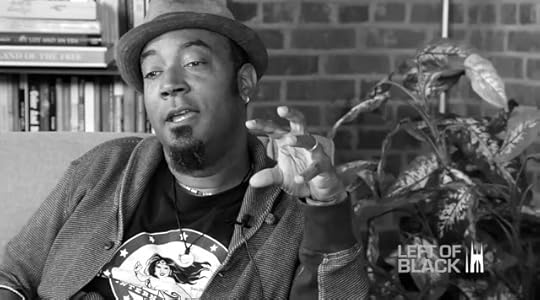 Left of Black S8:E1: Race + Politics + The Gentleman Cartoonist
Left of Black S8:E1: Race + Politics + The Gentleman Cartoonist
Cartoonist and Satirist Keith Knight sits down with Left of Black host Mark Anthony Neal to talk about his latest books They Shoot Black People Don't They?: 20 Years of Police Brutality Cartoons and Jake the Fake Keeps it Real with by Craig Robinson and Adam Mansbach.
Left of Black is hosted by Mark Anthony Neal and produced by Catherine Angst of the John Hope Franklin Center at Duke University and in collaboration with the Center for Arts + Digital Culture + Entrepreneurship (CADCE) and the Duke Council on Race + Ethnicity (DCORE).
***
Follow Left of Black on Twitter: @LeftofBlack
Published on September 15, 2017 15:14
September 13, 2017
#BackChannel: Late-Night TV in the Era of Trump & Remembering Dick Gregory
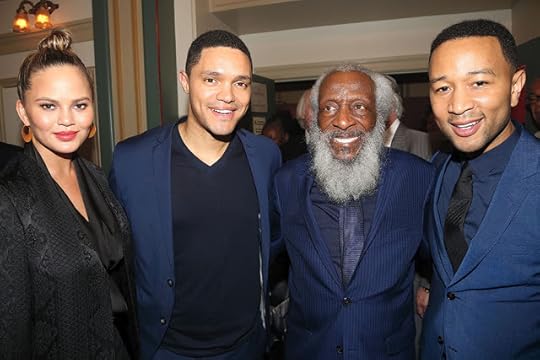 'Ever since President Donald Trump announced he was running for president in 2015, late-night television shows have taken on a new tone. Programs like The Late Show with Stephen Colbert and Late Night with Seth Meyers have adopted more political rhetoric, while The Daily Show continues to offer political satire with a diverse staff. State of Things host Frank Stasio talks about the recent politicization of late-night TV with regular contributors Natalie Bullock Brown, professor of film and broadcast media at St. Augustine’s University in Raleigh, and Mark Anthony Neal, chair of the department of African and African American studies at Duke University in Durham. They also discuss the legacy of comedian and activist Dick Gregory who died last month.' --
WUNC 91.5
'Ever since President Donald Trump announced he was running for president in 2015, late-night television shows have taken on a new tone. Programs like The Late Show with Stephen Colbert and Late Night with Seth Meyers have adopted more political rhetoric, while The Daily Show continues to offer political satire with a diverse staff. State of Things host Frank Stasio talks about the recent politicization of late-night TV with regular contributors Natalie Bullock Brown, professor of film and broadcast media at St. Augustine’s University in Raleigh, and Mark Anthony Neal, chair of the department of African and African American studies at Duke University in Durham. They also discuss the legacy of comedian and activist Dick Gregory who died last month.' --
WUNC 91.5
Published on September 13, 2017 17:23
Will "AI" Result in Mass Unemployment or a New Middle Class?
 'Luis Perez-Brava, a professor at MIT, thinks that we've probably been watching too many Terminator movies for us to really understand what AI actually is. It will (hopefully) (knock on wood) be much less hyper-intelligent humanoid killing machines and more of a sidekick role. Perez-Brava brings up a great point that many in the AI world gloss over: that we saw this kind of so-called "job killing" a century ago when Henry Ford created automation in the workplace; Luis posits that it won't be that much different than we're used to and that mankind should be creative enough to figure out how to assimilate human jobs and AI side by side.' -- Big Think
'Luis Perez-Brava, a professor at MIT, thinks that we've probably been watching too many Terminator movies for us to really understand what AI actually is. It will (hopefully) (knock on wood) be much less hyper-intelligent humanoid killing machines and more of a sidekick role. Perez-Brava brings up a great point that many in the AI world gloss over: that we saw this kind of so-called "job killing" a century ago when Henry Ford created automation in the workplace; Luis posits that it won't be that much different than we're used to and that mankind should be creative enough to figure out how to assimilate human jobs and AI side by side.' -- Big Think
Published on September 13, 2017 16:08
Hearing Robeson, Seeing Kaepernick: The Black Athlete Disappearance by Shana L. Redmond
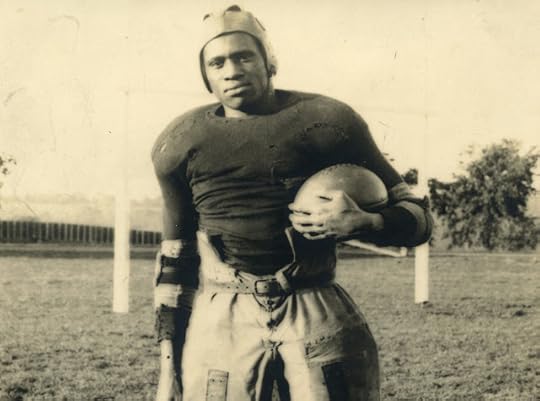 Hearing Robeson, Seeing Kaepernick: The Black Athlete Disappearanceby Shana L. Redmond | @ShanaRedmond | NewBlackMan (in Exile)
Hearing Robeson, Seeing Kaepernick: The Black Athlete Disappearanceby Shana L. Redmond | @ShanaRedmond | NewBlackMan (in Exile)In his recent Bleacher Report Mag essay, “Colin Kaepernick Has a Job,” Rembert Browne tells a story of the now former National Football League (NFL) quarterback from the other side of industry fame. Taking time with the people proximate to him, from family in northern California to current NFL players to his close advisors, Browne provocatively argues that Kaepernick “never existed” and wonders what it means “for a hero to disappear, after the opportunity of a lifetime…”
Kaepernick, as we know, was effectively banished from his profession because he was “inconvenient” for the NFL, for their revenue, for the smug entitlement of some League fans, for patriotism. He announced a political analysis that he has stood by with stoic fidelity in spite of the repercussions (social, professional, and financial) that have now rendered him, according to Browne, invisible.
I read this insightful article on the same day that I visited the Modern Records Centre at the University of Warwick in Coventry, England where I sought out another one of the Black disappeared, Paul Robeson (1898-1976), the multihyphenate extraordinaire—scholar-musician-actor-activist—who was also an NFL player and, at one time, the most famous Black man in the world. The juxtaposition of the two men is telling.
My research on the giant Robeson similarly is concerned with vanishing acts but, even more than that, I’m interested in his triumphant return in different forms throughout the twentieth century. I visited Warwick to find one community who called him—namely, the National Paul Robeson Committee (NPRC) who in the late 1950s organized a series of campaigns, conferences, and concerts in the U.K. to raise awareness of Robeson’s passport revocation. Initiated at the request of the U.S. State Department in 1950, the cancellation of his passport confined him to the U.S. for nearly a decade, causing his annual income to drop by 98 percent within three years.
Inside of the organization’s files I found people’s liberation activists speaking of Robeson in terms that announced no division between their struggles in Africa and his; unions organizing for petition signatories and using their political clout to encourage British parliamentarians to work their connections in the U.S. government on Robeson’s behalf; and everyday citizens challenging their neighbors and families in support of a man who most did not know personally but to whom they felt deeply, unapologetically connected.
On May 26, 1957 the NPRC hosted a conference and concert at St. Pancras Hall in London. Their appeal was simple: “Let Paul Robeson Sing.” Attended by one thousand participants and delegates from across labor, anticolonial struggles, and political organizations the event was said to represent more than a million people in the metropolitan area. Speakers from the floor included Member of Parliament (MP) Dr. Barnett Stross who argued that the Robeson “witch hunt” had become “big business, a huge racket with great political careers founded on it and a lot of money in it.” Labour Party hopeful Dr. David Pitt and opera star Martin Lawrence argued that Robeson deserved not only the freedom to travel but also the right and “freedom to work.”
Newspaper accounts in the wake of the event, during which Robeson sang via trans-Atlantic link from New York City, revealed the rapt attention of the audience as well as the continuing uncertainty of Robeson’s case and legacy. Titled “The Man Who Never Was,” an article from the period noted the extent of his disappearance, which included his purge from the 1918 All-American Football roster. “[E]ven the Nazis never pretended that the people they liquidated had never existed,” the author notes, but when faced with a four letter athlete and Rutgers valedictorian the U.S. remained committed to their mission: refusal of the “dangerous idea that a coloured man can be as good as a white man at everything.”
What Robeson’s future would hold beyond 1957 was uncertain but it was clear that, from the perspective of the U.S. government, his travel restriction must be enforced, for “Robeson is a big man with a big voice, and to let him loose on Europe and Asia would make it hard to maintain the story that he doesn’t exist.”
This too is the challenge for the NFL. Even as the 2017-2018 season starts without Colin Kaepernick, it’s hard to maintain the fiction of his invisibility when to speak of the televised football ratings dip is to speak his name; when one thousand people rally for him outside of the League’s New York headquarters; when his frat brothers march for him in Detroit. Just as Robeson’s elusive passport did not stop his voice from traveling, the absence of an NFL jersey does not keep Kaepernick from being an icon and leader. Browne’s story reveals that, like any good organizer, Kaepernick has a base, one that was never, really, composed of NFL fans—at least not exclusively. While important, they were a welcome addition to a project of building that Kaepernick slowly and quietly began before the stadium lights belonged to him.
That some NFL fans no longer scream his name with affection is inconsequential; Kaepernick has, like Robeson before him, found his calling. He has exercised the freedom to work in preparation and training for the team of a lifetime—a team more profound and illustrious than any the NFL can claim or imagine.
+++
Shana L. Redmond is a professor at UCLA and the author of Anthem: Social Movements and the Sound of Solidarity in the African Diaspora. She is currently writing a book about Paul Robeson titled Everything Man.
Published on September 13, 2017 07:13
September 12, 2017
Sighted Eyes/Feeling Heart: Lorraine Hansberry
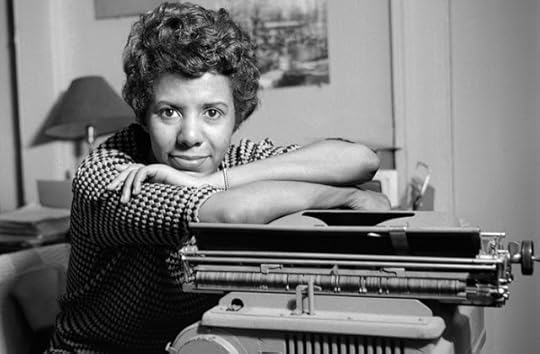 'At a time when women, people of color and homosexuals were confined to the margins of society, Lorraine Hansberry (1930-1965), best known for A Raisin in the Sun, boldly challenged U.S. society to live up to its ideals. Sighted Eyes/Feeling Heart, directed by Tracy Strain tells the dramatic story of the young, gifted and black woman who chose words to fight injustice—on stage and off.' -- ITVS
'At a time when women, people of color and homosexuals were confined to the margins of society, Lorraine Hansberry (1930-1965), best known for A Raisin in the Sun, boldly challenged U.S. society to live up to its ideals. Sighted Eyes/Feeling Heart, directed by Tracy Strain tells the dramatic story of the young, gifted and black woman who chose words to fight injustice—on stage and off.' -- ITVS
Published on September 12, 2017 19:30
Trailer: Sighted Eyes/Feeling Heart: Lorraine Hansberry
 'At a time when women, people of color and homosexuals were confined to the margins of society, Lorraine Hansberry (1930-1965), best known for A Raisin in the Sun, boldly challenged U.S. society to live up to its ideals. Sighted Eyes/Feeling Heart, directed by Tracy Strain tells the dramatic story of the young, gifted and black woman who chose words to fight injustice—on stage and off.' -- ITVS
'At a time when women, people of color and homosexuals were confined to the margins of society, Lorraine Hansberry (1930-1965), best known for A Raisin in the Sun, boldly challenged U.S. society to live up to its ideals. Sighted Eyes/Feeling Heart, directed by Tracy Strain tells the dramatic story of the young, gifted and black woman who chose words to fight injustice—on stage and off.' -- ITVS
Published on September 12, 2017 19:30
Mark Anthony Neal's Blog
- Mark Anthony Neal's profile
- 30 followers
Mark Anthony Neal isn't a Goodreads Author
(yet),
but they
do have a blog,
so here are some recent posts imported from
their feed.



